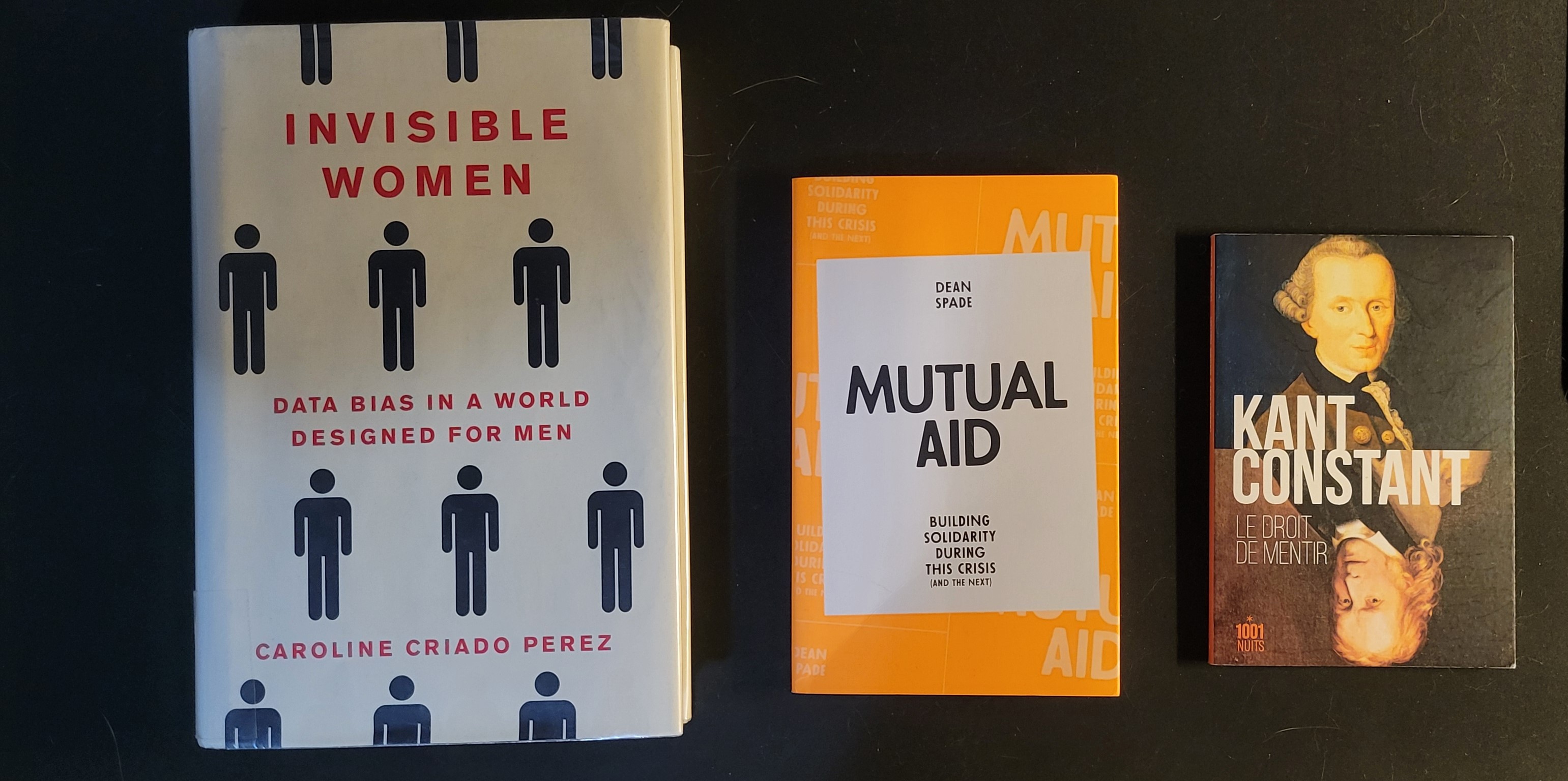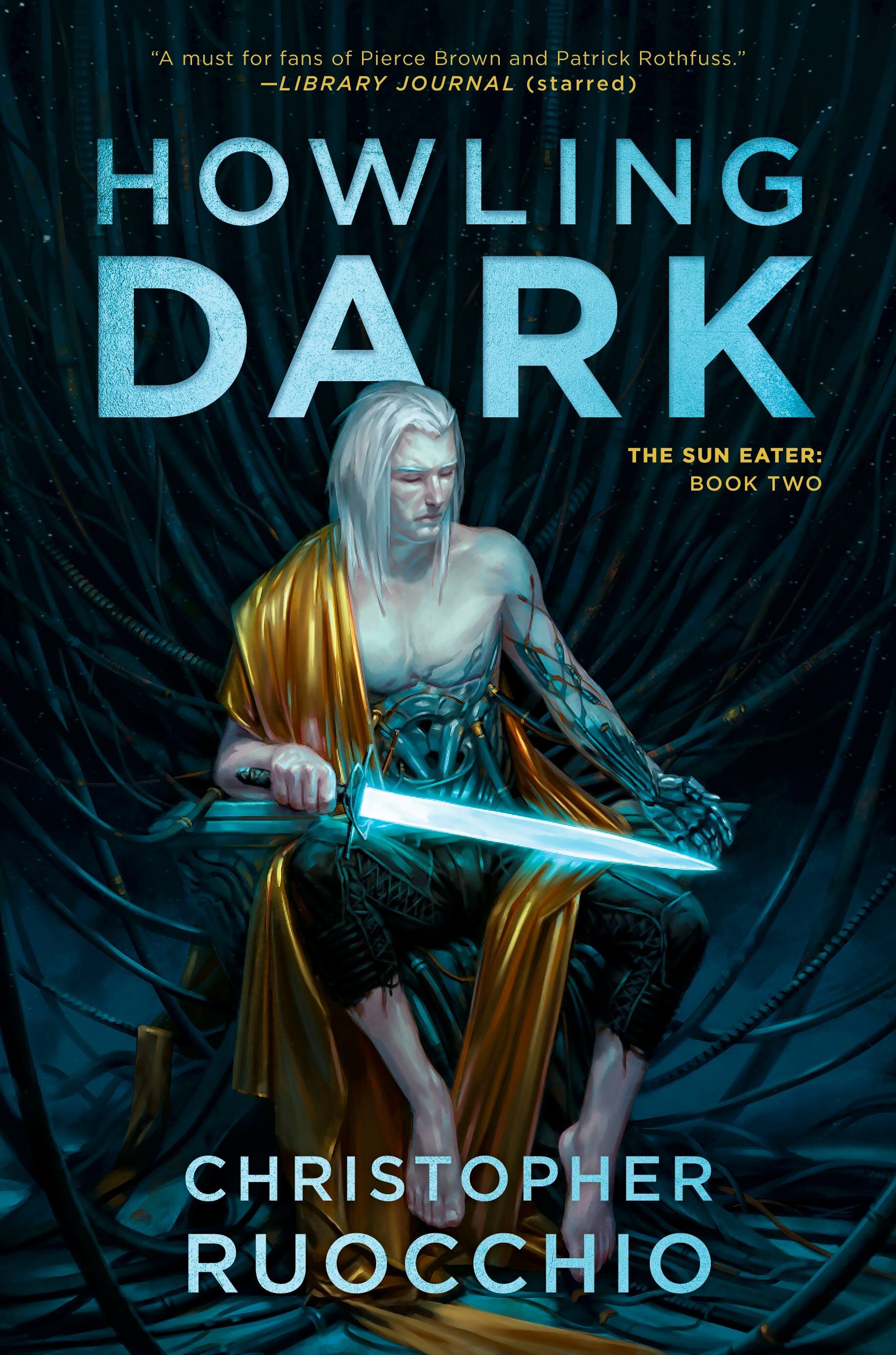November Readings

I must apologise for the late (a whole week!) release of last month's reading. While they normally come out on the 5th of each month, I dropped quite the lengthy article earlier this month and needed a bit more time to finish this one. Without further ado, let's get into it:
Howling Dark – Christopher Ruocchio
You know what, I lied: I didn't actually finish this book in October, the last 80 pages plagued me all the way until mid-November. It was such a slog to read through. It's not bad, but it just really, really didn't click for me; I'd rather be reading the other Dune books (liem you know what to do, I'll even accept you moving to bluesky)

Mutual Aid – Dean Spades
That was a great little book. It introduces (in the sense “describes”) the concept of mutual aid and goes on to describe how a mutual aid group could work, and what the common issues with those groups are. It was a really interesting read, especially since it was so politically committed. While it doesn't go super far, some things that the book took as granted were just not the admitted reality of even many left leaning people. It was nice to just kinda be like: ok, that's the situation, where do we go from there.
Mutual aid is something that I found particularly interesting in “The Assassination of Fred Hampton[...]” which we read with the bookclub last month. Two great examples of mutual aid groups in this are the Black Panther breakfast program, which is also mentioned in “Mutual Aid”, and Jeff's law office (at some point in the office). People organically just coming together to make their neighbourhood or city a better place is something I found super cool. This is not to be confused with charities, or billionaire funded organisations. It's by the people, for the people, no strings attached.
Some aspects (and usual pitfalls) of mutual aid can also be applied in other situations, and in one chapter I was often drawing parallels between the organisation of the mutual aid group and that of my IT department.
Mutual aid is a cool concept, and its functioning is interesting to read here; don't hesitate to borrow my copy of the book.

Le droit de mentir (The right to lie) – Emmanuel Kant & Benjamin Constant
In 1785, Kant published Grundlegung zur Metaphysik der Sitten (Groundwork of the Metaphysics of Morals), in which — amongst other things — he touches on the illegitimacy of lying. In 1796 a quirked-up french swiss (then french) boy decides to critique Kant's position in his book Des réactions politiques (On political reactions). The next year, Kant replies in a text title Über ein vermeintes Recht aus Menschenliebe zu lügen (On a supposed right to tell lie). The biggest feud in philosophy ensues, which lasts until they duel each other, and also indirectly leads to the Franco-Prussian War (this is a complete lie).
This book only solidified my belief that the great writer of old are known for the idea within their work despite their shit writing. I am willing to give a pass to Kant, as german is pretty hard to translate so that's not on him — and my german is not good enough to actually read the original. But I'm sorry Benjamin, your writing is shit. A coma digression within a coma digression, within a coma digression...
Apart from that, the arguments are interesting and while I do not have a fully formed opinion on whether it is moral to lie or not, they did bring up some good points. One that I thousght made particularly good sense is that some people — by their actions or words — have broken the social contract and therefore do not have the right to the truth and are not entitled to the truth. Saying the truth to them is therefore no more a duty. This gets destroyed by Kant in his next essay, but the reasoning is still provocative.
Even if there is not apparent feud, it's still funny to see Kant trash talk Benjamin; Benjamin had not named Kant in his original reply, and only gave him the “a german philosopher” nickname — Kant goes hard on him for that.
Good little read.

Invisible Women – Caroline Criado-Perez
*trips, drops book which slide over to your feet, cover facing up* -Oops, I dropped my feminist literature, I'm so sorry about that (I'm 6'3” btw) *bites lips*
For the synopsis, please refer to Elisa's Reading Roundup: Enjoying unemployment by binge-reading
This book is collection of anecdotes showcasing the lack of data we have about women specific issue, but also about the impact of universal issue on women. It is thankfully not a very dense, indigestible and rigorous text, and is overall well written. There are very clear divisions of topics in the chapters and parts, which make the book very easy to follow.
There are some very good points in there, and for the most parts, the anecdotes are well chosen to illustrate and issue, without getting too into the weeds. We have a nice selection of topics from the workplace, home life, healthcare... One really good point that was made, and that I hadn't really thought about, is that by taking the average human and making decisions based on that, the result will usually leave women at a disadvantage. For instance, safe exposure to certain chemicals mostly depends on weight and metabolism, and taking the genderless average of both will make the maximum threshold safe for men, but still unsafe for women. Of the things that I would never have thought about, it's how the economy and it's design are favouring men and reinforcing the gender gap issue, especially when it comes to tax credits and monetary benefits. There are many anecdotes that are about things that I would not have though could afffect women in particular, because they seem completely unrelated.
With the book being written, or at least published in 2019, COVID is obviously absent from the topics here, and I would really have been curious about what a chapter of this book dedicated to it would have been like. There was not only a big healthcare issue with the covid crisis, but also a restructuring of society especially in the workplace, with the recrudescence of gig-work and work from home which I think would have been interesting topics.
Another one of my unmet expectations, and were the book could fall a bit short, is in the analysis of the anecdotes, which is usually very surface level, if there is one.
One thing I found odd were the citations. With a book this filled to the brim with info, there are many citations. While I liked that the citations were separated in chapters, the format of most of them really leaves to be desired; it's just urls. This made reading up on the topics I wanted to go deeper in extremely annoying — who enjoys typing a long url in the search bar? It also strange that those almost all directed to news articles, rather than the source that those news articles use.
As I've discussed, most of the anecdotes are relevant, but some feel a bit out of place in the book. Two in particular jump at me. One of the early one was about who Todd Howard, after showcasing the character creation menu in Fallout 4 during E3 2016 and pointing out that you could play as either a man or woman, decided to play as a man. I'm not too sure what the point being made is here but I found hilarious that it was included. Then some anecdote just might not have enough substance to warrant being included: I was particularly interested in the part where it states that VR headsets are not well suited for women, because men and women use/prefer different mechanisms to process depth — parallax for men and shape-from-shading for women — and VR priorities parallax. However, there were no citations in this book. When doing research, I could only find 3 papers related to the subject, all from long before modern VR was developed. None of those papers gave a definitive answer on whether men and women did use or even prefer different depth perception mechanism, as any results were not significant enough (high p value, extremely low sample size, issues with experiment design...). At least in this last case, that ties in with, and supports, the thesis of the book; there is clear a lack of data on how specific issues affect women. Not only that but there is a distinct lack of will to even attempt to gather data about women.

Hunter X Hunter – Yoshihiro Togashi
Chapters 95-140
We continue the story and I'm glad we depart from the collecting money avenue to just do shenanigans or go on adventure. I liked the Yorknew arc, but I'm not too sure about the isekai one yet.
Going back to my issues with the manga; the argument that people who are actually strong don't bother with the small fries make sense (see Harrison's post on the café), but the characterisation of the tower of doom and the hunter exam still aren't super consistent in my eyes. Tetyana started to watch the anime and I caught a couple of episodes with her — and while it isn't fair to judge the manga based on the anime — just as I remembered in the manga they made the hunters out to be a big deal. Naturally, one could trust the magaka when he says that the hunter exam is the hardest exam in the world, and that is actually matters in the power structure of the universe. But it really doesn't and some characters could eat that exam for breakfast, which feels like the rug has been pulled from under me.
The story is still interesting, my fear is growing that nen is basically like stands/hamon now and it can do pretty much everything. I will report back on what extent later. Nothing has yet topped the fight between Uvo and the Shadows, maybe because I was still under the impression that HxH was bad. The symphony to Chrollo (where the troupe goes on a rampage) was sick. I was midly underwhelmed with the fight between Chrollo and Killua's father+grandfather. They had made Killua's family to be so goated that I was expecting more. Although I cannot complain about them being the strongest people in town anymore; they are getting bodied by the weakest creature of Greed Island. While they are strong, they have no idea how to use their strength. I stopped right when the Bomber reveals his identity, I think it's about to get hype.
no way they got a gargaydar as their first card!

Not too bad this month, and I also finished my backlog! While you might think this means more time for reading, the holiday season is upon us, which means less time overall. I will do my best, but also, I won't try too hard. Also a little change this month, I switched from Typora to Obsidian to write this. Having the rest of my monthly articles available with a click is really handy. But I like the focus that Typora provides, being so bare bones, so I will keep using it for standalone articles.
Thank you for reading my logorrhea Eddie